Imagine sipping on a refreshing, bubbly beverage that quenches your thirst without the added sugars or artificial sweeteners found in many commercial sodas. This delightful experience is made possible through the process of water carbonation. In this article, we’ll dive into the fascinating science behind water carbonation and explore the various benefits of carbonated water that make it a popular choice among health-conscious individuals.
Water carbonation is the process of infusing regular drinking water with carbon dioxide (CO2) gas to create a bubbly, fizzy beverage. This transformed water is known as carbonated water, sparkling water, or seltzer water. The carbonation process adds a refreshing effervescence and subtle flavor to the water, making it a popular alternative to still water or sugary sodas.
Whether you’re looking to reduce your intake of sugary drinks or simply want to enjoy a refreshing, guilt-free alternative, understanding the how to carbonate water at home can open up a world of possibilities. By exploring the science and benefits of water carbonation, you’ll be well on your way to enjoying a healthier, more flavorful hydration experience.
What is Water Carbonation?
Water carbonation is the process of infusing regular drinking water with carbon dioxide (CO2) gas to create a bubbly, fizzy beverage. This transformation is achieved by subjecting the water to high pressure and then dissolving the CO2 into the liquid. The carbonation process adds a refreshing effervescence and subtle flavor to the water, making it a popular alternative to still water or sugary sodas.
The carbonation process involves dissolving CO2 gas into the water under pressure, which increases the solubility of the gas. As the pressure is released, the dissolved CO2 comes out of the solution, creating the characteristic fizz and bubbles that define carbonated water. This process can be done both commercially and at home using specialized equipment.
Carbonated water, also known as sparkling water or seltzer, has gained popularity as a healthier alternative to traditional sodas and sugary drinks. The carbonation process does not add any calories, sweeteners, or artificial ingredients to the water, making it a refreshing and guilt-free option for those seeking a flavorful beverage.
The Science Behind Water Carbonation
The science behind water carbonation involves the principles of gas solubility and the chemical reactions that occur when carbon dioxide (CO2) is dissolved in water. When CO2 is forced into water under high pressure, the gas becomes more soluble and is able to dissolve into the liquid.
This process is governed by Henry’s law, which states that the amount of a gas that dissolves in a liquid is proportional to the partial pressure of that gas above the liquid. As the pressure increases, more CO2 can be dissolved in the water, resulting in the characteristic fizzy and bubbly texture of carbonated water.
Once the carbonated water is exposed to normal atmospheric pressure, the dissolved CO2 begins to come out of solution, forming the small bubbles that create the beverage’s sparkling sensation. This release of CO2 also slightly lowers the pH of the water, giving it a slightly acidic taste.
| Principle | Explanation |
|---|---|
| Henry’s Law | The amount of a gas that dissolves in a liquid is proportional to the partial pressure of that gas above the liquid. |
| CO2 Solubility | Increased pressure allows more CO2 to dissolve in the water, creating the fizzy, bubbly texture. |
| pH Reduction | The release of dissolved CO2 lowers the pH of the water, giving it a slightly acidic taste. |
By understanding the science behind water carbonation, we can appreciate the complex physical and chemical processes that transform ordinary water into the refreshing and effervescent beverage we know and love.
Benefits of Carbonated Water
Carbonated water, also known as sparkling water or seltzer, has gained popularity as a healthier alternative to sugary sodas and other sweetened beverages. While the carbonation process doesn’t inherently add any calories or sweeteners, it can provide several potential health benefits:
- Hydration: The fizzy nature of carbonated water can make it more appealing to drink, helping you stay hydrated throughout the day.
- Digestion: The carbonation in sparkling water may help promote healthy digestion by stimulating the production of gastric acid, which aids in breaking down food.
- Tooth Health: Unlike sugary sodas, carbonated water is not acidic and does not contain any added sugars, making it a better choice for maintaining dental health.
- Weight Management: Replacing sugary drinks with carbonated water can help you reduce your calorie intake, potentially supporting your weight management goals.
To fully enjoy the benefits of carbonated water, it’s important to select brands that are free of added sugars, artificial sweeteners, and other potentially unhealthy ingredients. Opt for plain, unsweetened carbonated water to maximize the health advantages it can offer.
| Benefit | Description |
|---|---|
| Hydration | The fizzy nature of carbonated water can make it more appealing to drink, helping you stay hydrated throughout the day. |
| Digestion | The carbonation in sparkling water may help promote healthy digestion by stimulating the production of gastric acid, which aids in breaking down food. |
| Tooth Health | Unlike sugary sodas, carbonated water is not acidic and does not contain any added sugars, making it a better choice for maintaining dental health. |
| Weight Management | Replacing sugary drinks with carbonated water can help you reduce your calorie intake, potentially supporting your weight management goals. |
How to Carbonate Water at Home
Carbonating water at home is a straightforward process that can be easily accomplished using specialized equipment. Here are the steps to help you easily carbonate water in the comfort of your own home:
- Acquire a Soda Maker – Purchase a dedicated soda maker or carbonation system designed for home use. These devices typically connect to a CO2 canister and allow you to infuse regular water with carbonation.
- Prepare the Water – Start with cold, filtered water for best results. Fill the carbonation container or bottle provided with your soda maker according to the manufacturer’s instructions.
- Carbonate the Water – Activate the soda maker by pressing the button or lever. This will release the CO2 into the water, creating the desired level of carbonation. The process typically takes less than a minute.
- Chill and Enjoy – Once carbonated, you can immediately pour the sparkling water into a glass and enjoy it chilled. Alternatively, you can store the carbonated water in the refrigerator for later use.
With a little practice, you’ll be able to achieve the perfect level of carbonation to suit your personal taste preferences. Experiment with different water temperatures, CO2 levels, and chilling times to find your ideal carbonated water experience.
| Soda Maker Brand | CO2 Canister Capacity | Carbonation Levels | Average Price |
|---|---|---|---|
| SodaStream | 60L | Up to 3 levels | $79.99 |
| Aarke Carbonator | 60L | Up to 3 levels | $199.00 |
| iSi Soda Siphon | N/A | Adjustable | $89.95 |
Remember, the key to successful home carbonation is following the manufacturer’s instructions closely and experimenting to find your preferred level of fizz. Enjoy your homemade sparkling water anytime!
Tips for Enjoying Carbonated Water
Carbonated water can be a refreshing and healthy alternative to sugary sodas and juices. Here are some tips to help you get the most out of your carbonated water experience:
- Experiment with Flavors – Try adding a slice of lemon, lime, or even a few muddled berries to your carbonated water for a natural flavor boost.
- Chill It Well – Carbonated water is best served chilled, so be sure to keep your bottles or cans refrigerated for maximum refreshment.
- Pair It with Food – Carbonated water can be a great accompaniment to meals, helping to cleanse the palate and aid digestion.
- Moderate Your Intake – While carbonated water is generally healthier than soda, it’s still important to drink it in moderation, as the carbonation can cause bloating or discomfort if consumed excessively.
By following these simple tips, you can enjoy the refreshing effervescence of carbonated water and reap the benefits of this healthy alternative to sugary beverages.
Conclusion
In conclusion, water carbonation has emerged as a captivating and innovative way to transform ordinary drinking water into a delightfully fizzy and refreshing beverage. By infusing water with carbon dioxide gas under pressure, this process creates a unique taste and texture that many find appealing as an alternative to sugary sodas or still water.
Whether you’re looking to reduce your intake of sugary drinks, enjoy a healthier hydration option, or simply indulge in a delightful and bubbly experience, carbonated water offers a versatile and satisfying solution. Its ability to provide a refreshing and effervescent twist to your daily water intake makes it a fantastic choice for those seeking a more exciting and healthier alternative to traditional beverages.
As you continue your journey of discovering the benefits and joys of water carbonation, we encourage you to explore the various methods of creating carbonated water at home, experiment with different flavors and carbonation levels, and ultimately find the perfect fizzy delight that suits your personal preferences. Embrace the effervescent transformation and elevate your hydration experience with the wonders of carbonated water.










